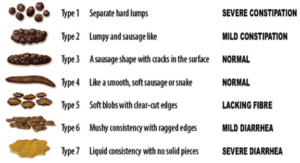Conservative Bowel Management
A conservative bowel program will combine a number of interventions in an individualized routine and may include dietary modifications especially re: fibre and fluid, digital rectal stimulation, digital removal of stool, abdominal massage, stimulation of the gastrocolic reflex, and use of oral or rectal medications (suppositories, enemas). Such a program will usually be performed on a daily or alternate day basis and until stool consistency is regulated and more ideal, depending on the needs of the individual. Conservative bowel management also implies that interventions are used on a stepwise basis – from least to most invasive.

Bristol Stool Scale – a commonly used tool in health care to discuss and quantify bowel movements. Most health care providers deem that 3 or 4 on the Bristol Stool Scale is ‘normal’ or ‘ideal’.
The Consortium for Spinal Cord Medicine guidelines (2020) and the Multidisciplinary Association of Spinal Cord Injury Professionals guidelines (MASCIP 2012) recommend that a conservative multifaceted bowel program should be developed initially in the rehabilitation phase following injury and that a comprehensive evaluation of bowel function and management is undertaken at least annually. The evaluation may include a patient history (including level and completeness of SCI, detailed history of current bowel routine management, stool form, continence and time spent on evacuation, diet and fluid intake, relevant medical conditions and medications, extent of care provision and home adaptations) and a detailed physical examination (including neurological examination to ascertain upper motor neuron vs. lower motor neuron type of neurogenic bowel and a rectal examination).
